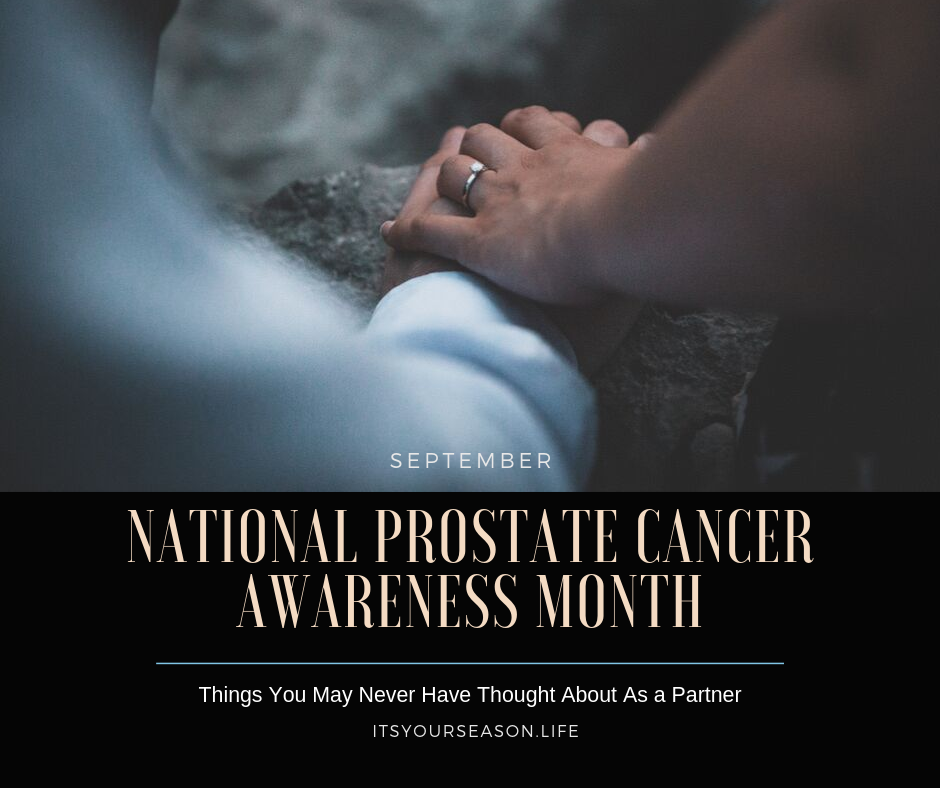This post may contain sensitive, but, hopefully, helpful content.
Cancer sucks. It doesn’t really matter what kind of cancer really. It just sucks. September is National Prostate Cancer Awareness Month and prostate cancer sucks for the guy and also for the partner. Survival is wonderful, so don’t get me wrong, but you have to get through the treatment, as a patient, and as a partner.
Prostate cancer is one of the most treatable cancers, and like all cancers, it has an impact on the family. As a prostate cancer couple, we have experienced quite a bit since my husband’s diagnosis in 2015. We do not want to pretend to be experts in the disease or treatment. We are not. We are only experts in just figuring out day by day how to manage the disease, the emotions, and the expectations. I can only hope that some of our experience will be helpful to others.
Some things to think about with a prostate cancer diagnosis during National Prostate Cancer Awareness Month:
- There are probably other friends and family members who have been diagnosed with prostate cancer who haven’t talked about it. Our case in point. Once we mentioned prostate cancer, we had several friends and family members come forth and share their experiences. I was honestly shocked. It was so helpful to know we weren’t alone. I was particularly appreciative of those friends who were rather graphic with their sharing and gave me tips on what to expect and how to cope.
- Prostatectomy for prostate cancer is a game-changer for the man and for the partner. The surgery options are better but there is a significant healing time including if and when you are able to resume normal sexual activity.
- Prostate cancer is the second leading cause of cancer death in men. It is treatable if caught early and has some excellent success rates. With that said, there is always the possibility of a hiccup. For example, my husband’s margins were clear in the operating room, but later the biopsies indicated that the cancer was in the lymph nodes which jacked us up to Stage IV prostate cancer. A real shocker.
- It appears that erectile dysfunction varies wildly in post radical prostatectomy patients but the results are still grim, in my humble opinion, even under the best of circumstances. Much seems to depend on if there is follow-up radiation or hormone reduction therapy, and the general health of the person. Although stats such as “about 40 to 50% of men will have returned to their pre-treatment function” seems impressive and gives some hope, there is a possibility you or your spouse is in the other 50% dealing with ED.
- Get educated on the disease. There are many evidence-based medicine books on the market. Prostate Cancer: A New Approach to Treatment and Healing is one of my favorites and I wish we had read this book on the initial diagnosis and before the surgery.
- It’s easy to get complacent when you are in the active surveillance or watchful waiting period. During this time, familiar yourself with the Gleason Score, the score used to determine the aggressiveness of the disease and the type of management.
- A prostatectomy is great in one way. My husband had absolutely no problems urinating ever again. He was a Trojan about rehabilitating his bladder. Be prepared for pre and post-op care, including managing a catheter for a week after surgery at home and comprehensive bladder retraining.
- Rehabilitating the erectile dysfunction is a whole process unto itself. I was so grateful to the several girlfriends who shared their experiences with their spouses. Some opted out of penile shots, vacuum pumps, and intraurethral pellets. I totally get that. It’s a mess and it is not romantic in any shape or form. For the two of you, do what works for you and your lifestyle.
- Why does it take so long for erectile function to recover after a prostatectomy? Possible explanations proposed are that the nerve is mechanically stretched during the procedure, thermal damage occurs during cauterization, nerve tissue is damaged trying to control bleeding, and or there is swelling associated with surgical trauma. A lot seems to depend on how healthy the person is going into surgery and the level of erectile dysfunction occurring prior to the procedure.
- A cancer diagnosis is a biggie. Stage IV is even bigger and requires all guns and many hands on deck. Prostate cancer has its guidelines for diet and exercise, particularly during radiation and hormone reduction therapy. We opted for a primarily plant-based diet since research indicates meat and dairy products may increase cancer risk or activity and my husband is working on his 30 METS of exercise per week.
Ironically, as this is prostate cancer awareness month, we are now one year out of surgery. We have completed six weeks of radiation and are 10 months into hormone reduction therapy. We are fairly confident hormone reduction therapy is adding to the function return delay. I’m sure not everyone is interested in our sex life (because, well, we don’t really have one, but we are intimate), but we did want to share some expectations and thoughts. So, here we go.
Hindsight being 20/20, we wish we had paid more attention to the important question posed by our surgeon: What is most important to you, sex or urinating? At the moment, my husband was so miserable with a super enlarged prostate, improving urinating was item #1. I supported that. It didn’t dawn on us that we would have problems with ED long term. The words were encouraging that it would return, the nerve-sparing procedure would help with that. I don’t believe the surgeon was lying. He was working off my husband’s Gleason Score, symptoms, CT scan, and biopsy. We looked like a minimal risk kind of couple and be in that 50% success rate of the function returning within a year or two. We were so engulfed in the sudden urgency of surgery we didn’t think about what we would or would not be doing in that one to two years or how to prepare emotionally for the loss of sexual intimacy.
We failed to ask or do our homework too much on ED, such as:
- How long will it take for the function to return?
- What should we be doing during the waiting period? Specifically, sexual therapy exercises? Penile massage? Appointments with a urologist who specializes in ED?
- Do we need assistive devices or medications?
- Is there anything that might prevent us from being on the course of action we are on, such as cancer being in the lymph nodes?
- How can we best prepare not just for the surgery, but for what life will be like without sex as a couple, because frankly, we never thought about that, and perhaps you haven’t either?
- Hmmm, should we go and have a “last hurrah” before the surgery that is such as a gamechanger?
Since my husband is on hormone reduction therapy, there is a strong possibility the drugs are inhibiting his functional return. I will say for a brief moment in time before we started the therapy, we had a micro-moment of hope. Now, we are treating the utilization of treatment methods similar to any other kind of rehabilitation. If you don’t use it, you lose it. I understand this is particular to blood flow in the region. So, although we don’t particularly feel like having “quality time” like we did last year, we know that for the future, we want to try everything possible. We don’t want to sit back after one more year of hormone reduction therapy and wish we had been “exercising” and “treating” ED using all the known methods possible.
At first, I didn’t get why my mother in law said, “we don’t do that anymore!” after we were bantering in a fun way about aging and intimacy. Now I do. My father in law had prostate cancer, a prostatectomy, and significant problems with urination for, goodness now, decades. More information than you wanted to know. But it is important. If we don’t talk about it, we just suck it up and suffer. Or wonder what is normal. Or not ask questions. Or read medical specialty sites and hope we are in the 50% success. Or do nothing.
We still maintain hope we are in the 50%. If not, we can say we gave it our best shot. In the meantime, we have learned new ways to be intimate. Marriage is for the long term. Marriage or partnering is not always a bed of roses, but it is a garden of love. For better or for worse. In good times and in the dearth of post-prostatectomy. As I tend to say, it could always be worse. We have hope. And we are better armed with information.
So, here is our new season of life. We didn’t anticipate this in our wildest dreams. Most importantly, as with all cancers, be kind to each. Be patient. Talk. Have quality time. Experience those moments of awe. Hold hands. Dream big.
Need some basic information on prostate health? Meet Joe Prostate from AARP!
P.S. Since I wrote this article, my husband’s hormone reduction therapy was reduced from two years to one year. See! There is so amazing research out there and things can change quickly. We are thankful!





